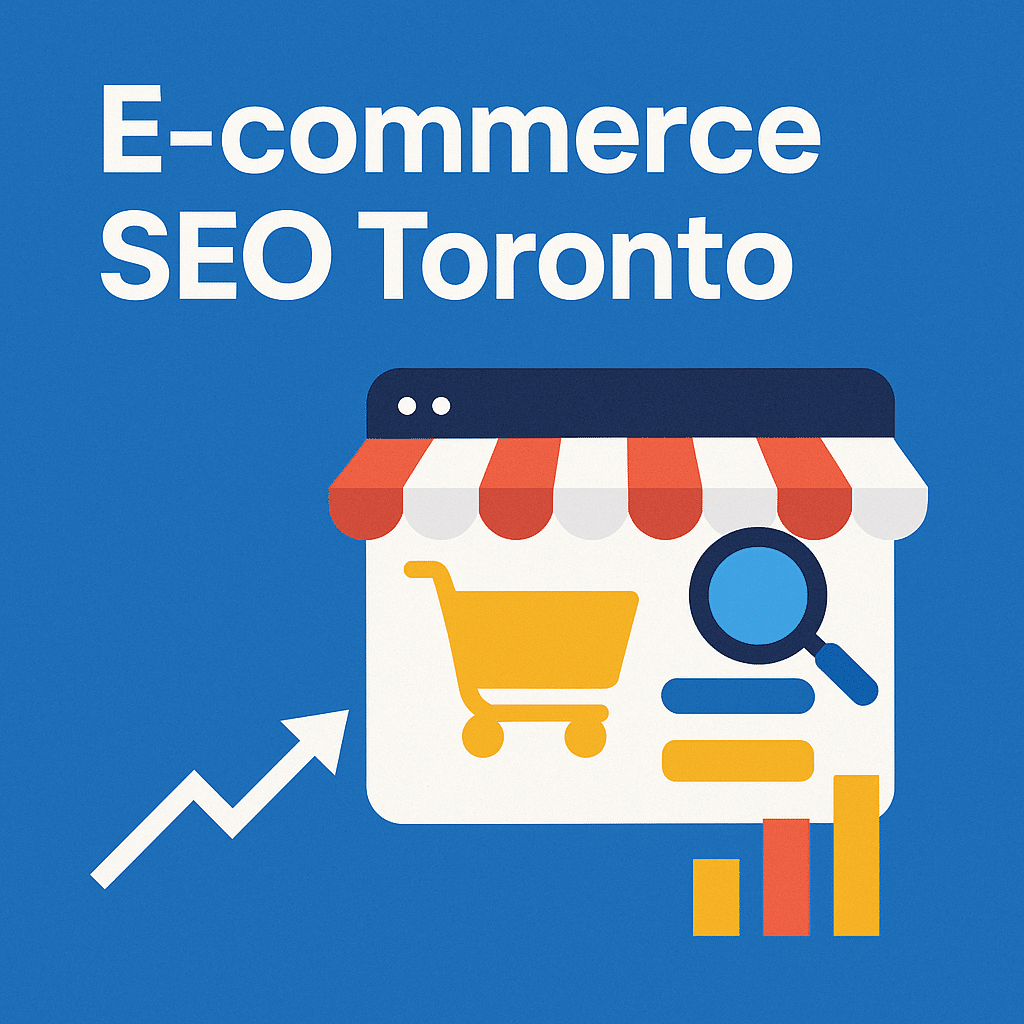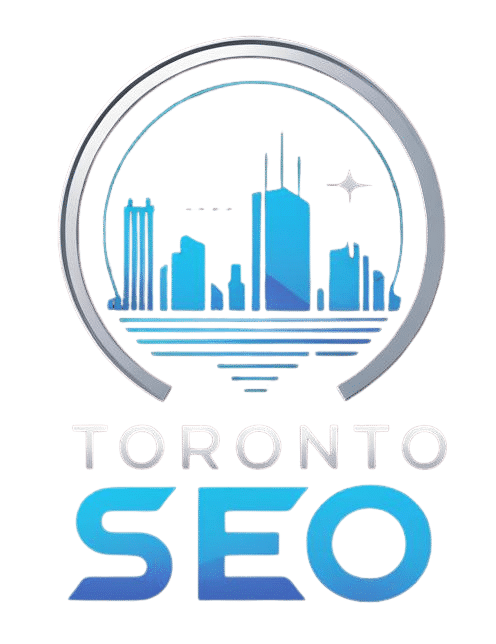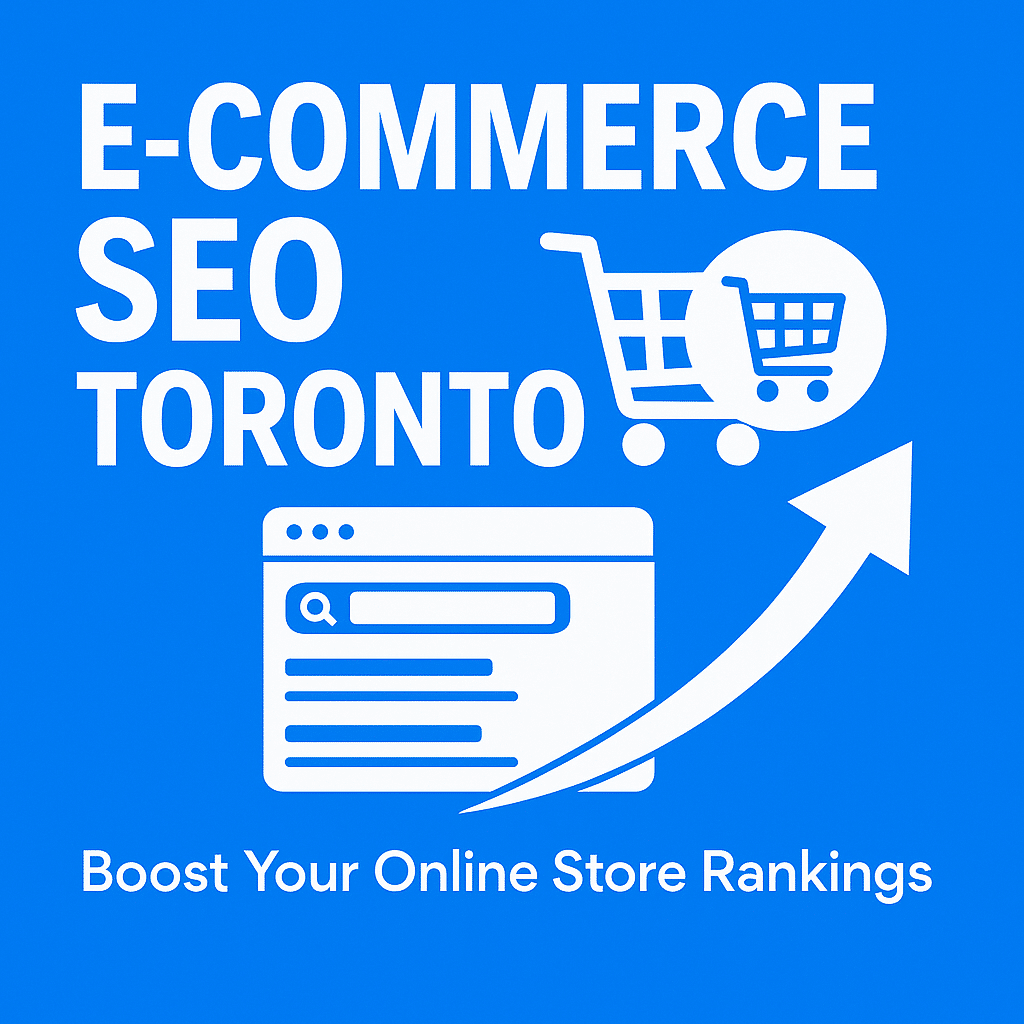Dominate Local and Global Search Rankings

In the competitive digital landscape of Toronto, e-commerce businesses need more than a visually appealing website to stand out. E-commerce SEO in Toronto is the cornerstone of driving organic traffic, increasing sales, and outperforming competitors. By implementing a tailored strategy, online stores can leverage search engines to reach both local buyers and international markets.
Why E-commerce SEO is Crucial for Toronto Businesses
E-commerce websites rely heavily on organic search visibility. Without proper SEO, even the best products will remain hidden from potential buyers. Toronto’s e-commerce sector is booming, with thousands of online retailers competing for the same keywords. Strategic SEO ensures your store ranks higher in Google, captures targeted leads, and converts visitors into loyal customers.
Key Components of E-commerce SEO in Toronto
1. Keyword Research for High-Converting Terms
The foundation of a successful SEO strategy is in-depth keyword research. For e-commerce businesses in Toronto, this means identifying:
Product-specific keywords (e.g., “buy running shoes Toronto”).
Location-based keywords (e.g., “best online fashion store Toronto”).
Transactional keywords with high purchase intent.
Tools like SEMrush, Ahrefs, and Google Keyword Planner help uncover profitable keywords that your competitors might be ignoring.
2. On-Page SEO for E-commerce Stores
Optimizing product and category pages with SEO-rich titles, meta descriptions, and header tags is crucial. Each product page should have:
A unique meta title and description targeting local terms.
High-quality product descriptions with semantic keywords.
Proper use of H1, H2, and H3 headings for structured readability.
User-friendly URLs (e.g.,
/women-shoes-torontoinstead of/product?id=123).
3. Technical SEO Optimization
A strong technical foundation ensures Google can easily crawl and index your site. Key technical factors include:
Mobile-first design for seamless user experience.
Fast page load speed (ideally under 2 seconds).
Secure HTTPS protocols.
Structured data and schema markup for products, prices, and reviews.
Canonical tags to prevent duplicate content issues on similar product pages.
4. Content Marketing for E-commerce
Content plays a major role in ranking high for competitive e-commerce keywords. Toronto businesses can build authority by:
Publishing buying guides, product comparisons, and how-to articles.
Creating location-focused blog posts targeting “Toronto shoppers.”
Integrating user-generated content, such as reviews and testimonials.
High-quality content not only boosts rankings but also builds trust and improves conversion rates.
5. Local SEO for E-commerce Stores
While e-commerce often targets national or global markets, local SEO is invaluable for Toronto-based retailers. Key tactics include:
Optimizing Google Business Profile with correct store information.
Building NAP (Name, Address, Phone) consistency across local directories.
Acquiring local backlinks from Toronto-based websites, blogs, and news outlets.
Creating geo-specific landing pages for better visibility in local searches.
E-commerce Link Building Strategies
6. Guest Posting and Outreach
Securing backlinks from reputable websites is critical for e-commerce SEO. Target Canadian and Toronto-based blogs, influencers, and local business directories.
7. Influencer Collaborations
Partnering with Toronto influencers for product reviews or sponsored content generates both brand exposure and valuable backlinks.
8. Digital PR Campaigns
Feature your store in Toronto news outlets or niche online publications to earn authoritative links that improve domain authority.
Advanced E-commerce SEO Techniques
9. Optimizing for Voice Search
With the rise of voice-enabled devices, targeting conversational queries like “Where can I buy eco-friendly clothes in Toronto?” helps capture voice search traffic.
10. Image SEO
Since product images drive e-commerce sales, every image should have:
Descriptive alt text using keywords.
Compressed file sizes for faster loading.
Structured naming conventions (e.g.,
toronto-leather-handbag.jpg).
11. Conversion Rate Optimization (CRO)
SEO and CRO go hand-in-hand. By analyzing user behavior, heatmaps, and sales funnels, you can:
Improve product page layouts.
Simplify checkout processes.
Add trust signals such as security badges, reviews, and local shipping details.
E-commerce SEO Mistakes to Avoid
Duplicate Product Descriptions
Many Toronto stores copy manufacturer descriptions, leading to duplicate content penalties. Write unique, engaging content for every product.
Ignoring Mobile SEO
With mobile shopping growing rapidly, neglecting mobile performance is a major SEO failure.
Lack of Internal Linking
Strategically linking between product pages, blog posts, and categories helps distribute authority and keeps visitors engaged.
Benefits of Professional E-commerce SEO in Toronto
Increased Visibility: Appear on top of Google for both local and national searches.
Higher Conversion Rates: Attract visitors with high buying intent.
Cost-Effective Marketing: Reduce dependency on paid ads by generating free, sustainable organic traffic.
Brand Authority: Build trust through expert content and positive search presence.
Future Trends in E-commerce SEO Toronto
AI-Powered SEO
Toronto e-commerce companies are adopting AI tools to automate content creation, keyword analysis, and competitor research.
User Experience (UX) Signals
Google increasingly prioritizes page experience metrics like Core Web Vitals, mobile usability, and interactive design.
Personalized Search Results
Search engines now focus on personalized shopping experiences, making structured product data even more crucial.
E-commerce SEO Tools Every Toronto Business Needs
Google Search Console – For tracking search performance and fixing crawl issues.
Screaming Frog SEO Spider – For technical audits.
Surfer SEO – For optimizing content structure and keyword density.
Hotjar or Crazy Egg – For CRO and user behavior tracking.
FAQs About E-commerce SEO in Toronto
How long does it take to see results with e-commerce SEO?
Most Toronto e-commerce businesses start seeing noticeable results within 3-6 months of consistent SEO work.
Should I hire an e-commerce SEO agency in Toronto?
Yes, working with a local agency helps you leverage regional insights, local backlink networks, and competitive analysis.
What’s the difference between local SEO and e-commerce SEO?
Local SEO focuses on ranking for location-based terms, while e-commerce SEO often has a broader national or global focus. Combining both strategies is essential for Toronto businesses with both physical and online stores.
By implementing these e-commerce SEO Toronto strategies, your online store can outperform competitors, dominate Google rankings, and achieve sustainable growth.


